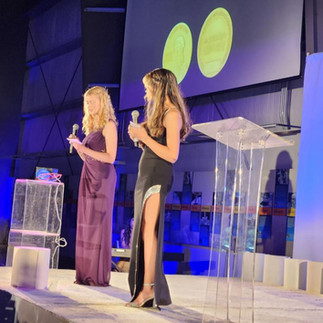She's STEMspirational! Meet Teen Inventor Lydia Denton
- Diane Schnoor
- Aug 29, 2023
- 10 min read
Updated: Sep 2, 2023

She's STEMspirational! Meet youth inventor Lydia Denton. At 15, she's already been honored for many of her inventions, including the Beat the Heat car seat. In this episode of the Adventures in Learning Podcast, we explore strategies for engaging girls in STEM and inventing, as well as secrets to being well-rounded and happy. Check out the highlights and some of my favorite quotes from the episode below. There are links to Lydia's inventions, as well as links to the full podcast and Youtube episodes.
[00:52] Lydia's Background and Inventions:
Lydia shares her journey as an inventor since the second grade.
Her diverse education path, from homeschool to charter arts school to early college, has shaped her well-roundedness.
Lydia shares a prototype of her newest invention, the Halcyon bracelet, designed to address Body Focused Repetitive Behaviors (BFRBs).
We discuss some of Lydia's winning inventions, including the Beat the Heat car seat, Breathe, and the Picadae Helmet.
Lydia shares insights on how STEM has taught her resilience and problem-solving through challenges.

I discovered I really loved inventing because it was a really cool way to solve problems by taking all of these different elements and different skills and being able to kind of mesh them together and create something that you know is going to help other people. -- Lydia Denton
Check out some of Lydia's cool inventions here!
Lydia: Probably the one I'm most well known for is the Beat the Heat car seat. It's a car seat that helps prevent hot car deaths. I gained a lot of attention and traction through this. I was on Good Morning America and People magazine and a lot of other really big news outlets. And that was, I think, three years ago in 2020.
Lydia: I've also created a lot of inventions for different competitions. I created Breathe with a group from school to help with childhood drownings and hypoxia
Lydia: I also created the Picadae Helmet, which helps slow concussions and a lot of sports players.
Note: start at 3:30 for the demonstration of the prototype.
Lydia: And recently, I've created a physical prototype of an idea I had quite a few years ago of the Halcyon bracelet that helps with BFRBs, which are body focused, repetitive behaviors, which I struggle with. So this is something that brings awareness to the fact that you might be doing one of these body focused, repetitive behaviors. Whether it's like touching your face or messing with your hair or picking out your nails or biting your nails. This would help bring awareness to this, since it's often done subconsciously. So here we have a headband that has a sensor on it, and if you get your hand near it, then it will buzz these sensors. So I don't know if you can see the buzzing of the sensors, but when you get your hand close to this, this bracelet with two little buzzers inside, will vibrate and let you know that you're picking at the problem area that you might have.
Dr. Diane: Oh, that is so cool. And you're working on the prototype now. Are there plans to enter it into any competitions or to try to take it further?
Lydia: I think I did enter it into a few competitions when I first came up with the idea with a group, and it was, I think, last month when I actually created a working prototype of it. I do hope at some point that I can get it out there, especially because I know it would benefit me and so many others who struggle with this. So I'm hoping that at some point it can get out there, but right now, I'm not exactly sure where it's going to end up.

So what does STEM mean to you? I know that people hold you up as an example of young women in STEM. What does that even mean?
Lydia: So STEM for me is using all of these different skills that you've acquired throughout school or outside of school and using it to problem solve and to help all these different problems that might affect you or people in your community. By using STEM and either making inventions or just being able to solve problems, it really just makes life a whole lot easier for you and those around you and can make the world a better place.
I've learned a lot from STEM that I should never give up. It's taught me a lot of perseverance to learn from my failures and be able to move forward instead of getting stuck there. I'm able to use that and propel myself forward throughout the rest of whatever I'm trying to do. -- Lydia Denton
For example, it took us over 100 tries to get the car seat up and working. It took forever, it felt like. But we knew that this was something we really wanted, and we wanted this to be out there and actually help people. So we were able to persevere through every single problem that we encountered.
[07:33] Problem Solving and Inventing Process:
We delve into Lydia's invention process and her strategic approach to solving problems.
Lydia emphasizes the vital role of mentors in helping young inventors overcome obstacles during the creation process.

Lydia: Usually, I will hear about a problem in the news, or it might be something affecting me or someone in my community with the Beat the Heat car seat. We had heard about it through the news. We had heard a pair of twins had sadly died in a hot car during the summer, and we were just devastated. It was in our small town, and it felt very weird having something that tragic happen. And I knew I wanted to do something about it, but I didn't know how I wanted to go about it. So I brainstormed different ideas of maybe an app, different monitoring services, different ideas that might be able to help this problem. And I finally landed on the Beat the Heat car seat design. And once I had the design and what I wanted to do, I created a circuit schematic, which is basically a map of all the electronics that would be in it. And I was able to get all of the parts that I would need to build this. And with a lot of mentoring and with the help of my siblings, with coding or soldering different things together, I was able to finally create the entire invention. Even though it took a lot of effort and a lot of time, I was able to persevere through everything and create the final invention. It's not what it would look like if it went on shelves, but it's at least proof of what I wanted to be out there and proof of my concept of what the invention could be.
What is the importance of mentoring? How has that helped and impacted what you do?

Lydia: Well, I think in almost everything that you do, there's going to be some hitch, something that you might not know as well as you thought you did or something you just plain didn't know was a thing or don't know much about. So, especially with me, whenever I use a mentor, it's on something that I know I can't do on my own. And so sometimes that is finding a YouTube video to help me learn a new skill, or it's using someone like my mom or teachers who know more about a certain subject than I do. A really good example is we have a neighbor, Mark, who's a few houses down from us. He was a retired aerospace engineer, and so he knew a lot about creating inventions and how to wire things the most efficient way without burning the house down, which my mom was quite thankful for.
Using mentors really makes the whole process a lot smoother and makes it so it's a lot less frustrating at some points.
[11:21] STEM and Encouraging Diversity:
The conversation shifts to promoting women's participation in STEM, challenging stereotypes and creating inclusivity.
Lydia shares strategies for encouraging young women's interest in STEM and cites examples of role models, including when Miss America did a science experiment as her special talent and ended up winning the whole competition and Emily's Wonder Lab on Netflix.
Acting and STEM go hand in hand -- Lydia shares how her involvement in acting complements her STEM pursuits, enhancing her communication skills.
So what do you wish people knew about STEM?

Lydia: I wish that people knew it's not just what you learn in science class. I feel like a lot of people are discouraged from doing STEM in different science things because they think it's just what you learn in science class, and it's not as fun as it really can be.
I find creating all these prototypes really cool and interesting because you're able to take all of these different things and apply it to something rather than just memorizing facts.
I feel like a lot of people think that you need expensive supplies or a really good STEM lab to be able to create stuff or to pursue a career in STEM.
But I found, with me, a lot of the stuff that I've done, I've been able to create almost every invention off of a $50 Arduino kit off of Amazon.
I've used that for probably eight or nine years now, and it's been able to help me through every single invention. And they're not fancy stuff. It's just something that I know will make it work.
And I think that you can learn just so much by stuff not working or stuff going wrong and having to go back and tweak it and to fix it, that it helps you stick with it in the long run and know what you can do better next time. And a lot of people really think that you have to be a genius or some sort of science and math savant to be able to create all of these things. But I don't think that's necessarily true. You just have to have a willingness to learn and perseverance, which you can always learn as you go along.
I know I'm a lot more patient with inventions now than I was in second grade. So I think it's really just a learning process and being able to take all these different things and use mentors and all the different resources and create something that you know will impact others.
[15:09] Upcoming Plans and Dreams:
Lydia talks about her recent LA trip for a competition on her Breathe invention and the diverse team of females behind it (Spoiler alert: they won first prize in their age group)
We explore the importance of female STEM role models and the impact of representation.
Lydia shares some bookspirations -- The Boy Who Harnessed the Wind and Chasing Space
About four years ago, Lydia and her teammates created an invention called Breathe to help with childhood drowning and hypoxia by continuously monitoring your blood oxygen levels.
Lydia: And we created this idea and entered it into this competition knowing that it was a very long shot that most likely we wouldn't get all the way to the final round and then COVID put everything on pause. And they finally resumed the competition this year. And we found out about a month ago that we were one of the finalists. So we had a Zoom meeting with them and told them more about our idea with like, two days notice, and they let us know that we had won first in our age division and that we'd be moving on to the final round in LA.
They were flown out to Los Angeles, where they received red carpet treatment, the opportunity to pitch their idea and network, and, of course, the trip to Disneyland. Spoiler Alert: They won first prize in their age group!
Lydia: And we get to share our idea to try to network it more and be able to get it out there to someone who might be able to take it and run with it. And I'm very excited because our group is a very diverse group. We're all women in STEM, and we have a Hispanic member, and we also have a Pacific Islander member as part of our group, so we're all coming from very different backgrounds, so we have a lot of different input going into this. And I think it's just really cool because we're able to encourage others to do the same.
Note: Check out this article about the competition.

A few years ago, Lydia did a book report on Chasing Space by Leland Melvin.
Lydia: He shares his story of how he became an astronaut. And you see throughout the book all the different places where he went through a lot of hardships. He failed academically, sometimes in school. He lost his football career due to injuries. Then he lost his hearing during training. But he still never gave up and became an astronaut anyway because it was something he was passionate about.
And I think that's something very important to share with people, that if you're passionate about something, to keep working at it until you can get there in the end. -- Lydia Denton
[21:48] Future Goals and Aspirations:
Lydia discusses her upcoming projects, including a feature with Discovery Education and efforts to establish a Society of Women Engineers chapter at her school.
Lydia shares her adaptable approach to the future, prioritizing happiness and making a positive impact in the world.
So what are some big things that are going on for you right now?

Lydia: So a lot of science stuff has actually come up this summer. Earlier this summer, I was able to film with Discovery Education, talking about my identity as a kid inventor and a woman in STEM. I can't share much about it now, but I'm hoping at the end of this year or early 2024 that it will be coming out and I'm able to share it with other people. And this upcoming school year, I plan to create a new chapter of the Society of Women Engineers at my school. I'm also a Carolina Biological Young Innovator, and hopefully I'll be presenting at a conference this fall.
And do you have sort of big dreams or big aspirations for yourself, for the future?
Lydia: I think I know for a fact that my interests are really subject to change. I know that within the coming years, I know I'm going to be interested in so many different things. Right now, I really do love being an inventor, but I'm also an actor. I like singing, and I recently learned how to play guitar, and I'm working on that in Ukulele. And I know that throughout high school, I'm going to be opened up to so many new opportunities that I never had before, especially since I'm at the early college. I might take a college class in something that I really love and I want to pursue that as a career, but I haven't got there yet, so I don't know at this point. So I'm really just going to go with the flow and see where life takes me.
Wherever I end up, I want to be somewhere that I'm going to be the happiest. And my overall goal is to make the world better just because I'm a little part of it. -- Lydia Denton
Listen to the full episode of this podcast.
Check out the YouTube episode of this podcast.










